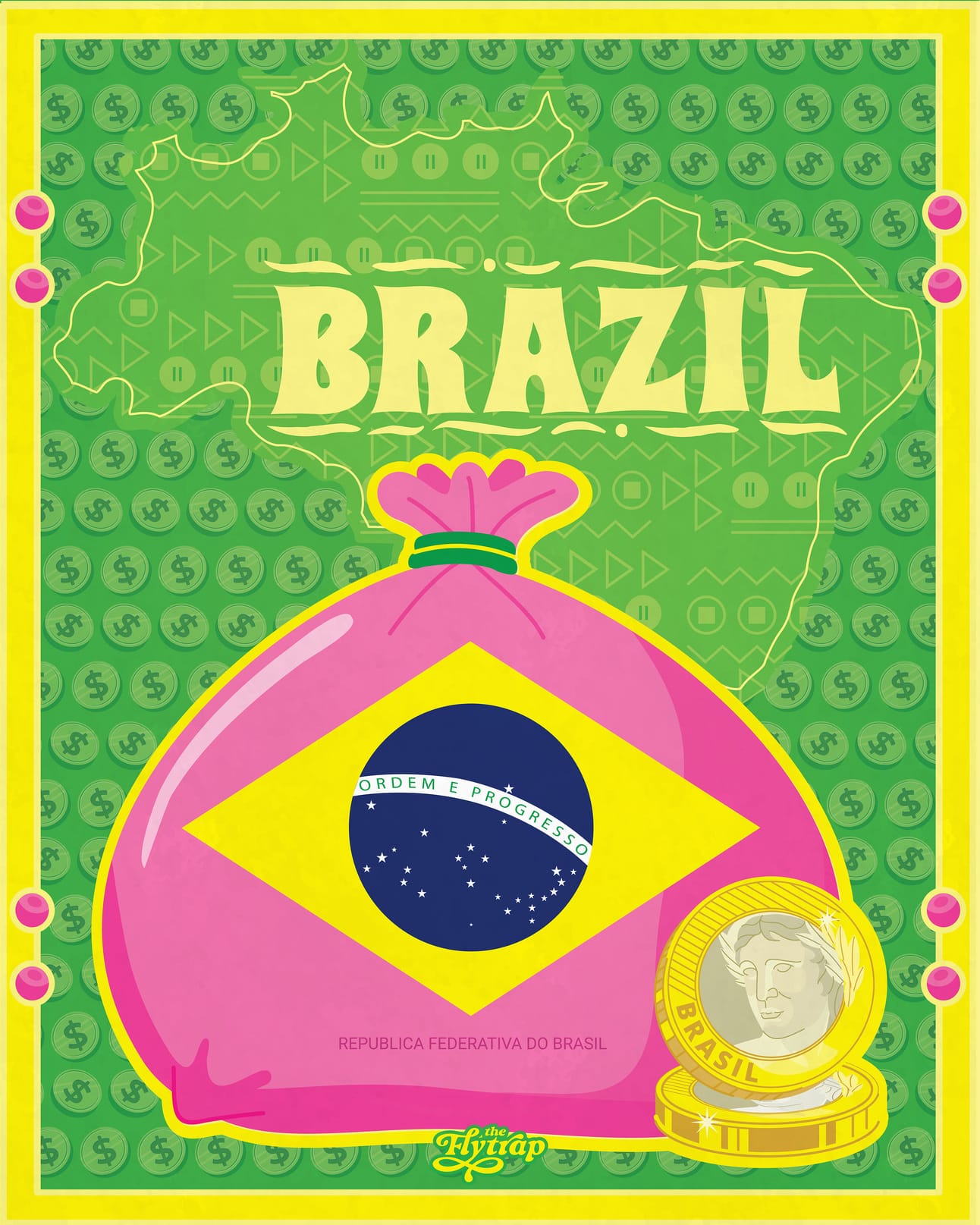You’ve heard of Pink Money, but have you heard of Brazil Money?
Will the global north ever love Brazilian culture as much as it loves our money?

Editor's note: Love this art? The Flytrap Merch Store is here for you!
When I was growing up, the bands and pop stars I admired were always very far from where I lived, and the idea of their tours actually reaching my country, Brazil, was an outlandish teenage dream. If pop stars did venture south of the equator, it was an anomaly, and the Brazilian fans of any given artist knew they wouldn’t have the opportunity to see them perform any time soon if they missed out on the event.
This dynamic started to change—at least in Rio de Janeiro, where I lived at the time—in 2011, when the Rock in Rio festival made a comeback and brought international pop stars and bands to the city, offering a relatively affordable (compared to festival tickets nowadays) opportunity to see globally acclaimed acts. I went to see Rihanna and Red Hot Chilli Peppers and the festival hosted other amazing headliners like Shakira, Coldplay, and many, many others.
I was 21, and it was my first festival experience. It felt like this was my one and only chance to hear the music I loved so much live, and obviously, I had the time of my life. I remember climbing on my friend’s boyfriend’s shoulders to see a shirtless Anthony Kiedis running up and down the stage behind a sea of people, singing along to some of my favorite songs.
It really did feel like a dream come true, especially because I had heard of this kind of exhilaration before and I was finally experiencing it. Growing up, my dad had always told me about the Rock in Rio concerts he attended, especially Freddie Mercury’s performance of “Love of My Life” on the festival stage in 1985. It was the third and last time Queen would ever perform in Brazil, and Mercury was so surprised by how many people knew the lyrics to his song that he stopped singing to listen to the crowd. That audience-singer exchange became so legendary for Queen fans in Brazil that it almost felt like I had lived it. And at that festival in 2011, I witnessed memorable performances too. It felt like an echo of the past, but in the present.
I could never have imagined that over a decade later, Brazil would become a coveted destination for pop stars and rock bands because of the internet.
I could never have imagined that over a decade later, Brazil would become a coveted destination for pop stars and rock bands because of the internet. According to a recently published study by MIDiA Research, more than 80% of Brazil’s recorded music revenue in 2023 was driven by streaming, which makes it the seventh largest streaming market in the world. MIDiA’s takeaway: “International players have their eyes on Brazil not just as an import market, but also a target for investment.”
This shift has been happening fast: in 2022, Brazil was the 10th biggest streaming market in the world. Incredibly, Brazil is now among the top five streaming markets for many international artists like Billie Eilish and The Weeknd, according to the International Federation of the Phonographic Industry (IFPI)’s latest report on the global state of the music industry. The report speculates that this may mean that Brazilian music may become globally popular soon, a forecast echoed by The Economist in a report about the working-class, Black music genre Brazilian funk. But I’m skeptical of this forecast in particular, as I’m not convinced that Brazil being a good market for music consumption is necessarily an indication that the global north will want to consume Brazilian cultural products in turn.
Of course, it’s undeniable that Brazil is having a moment on the global stage, particularly with the success of the film I’m Still Here, which I’ve written about elsewhere and was nominated for Best International Feature Film, Best Film, and Best Actress at the 97th Academy Awards. This moment of global cultural relevance feels like a necessary tipping point to the average Brazilian because we suffer from what Brazilian sports writer Nelson Rodrigues termed “mongrel complex,” where collectively, Brazilians view ourselves as inferior to the rest of the world. Rodrigues argued that this was a place where Brazilians put themselves voluntarily decades ago, but in 2025 the term exists in a new context. In a world where the global north’s increasingly (and sometimes literally) Trumpian leaders see global south nations as “shitholes,” it’s not wrong to assert that global south cultures are seen as inferior to global north cultures and that there is a global understanding of the south of the equator as lesser than.
Getting some recognition from the powers that have repeatedly told us we are nothing feels somewhat satisfying, if not vindicating. But it has required that Brazilians put their money where their mouths are—that Brazil shows itself worthy of financial investment. As the biggest country in Latin America, this is a privilege that many smaller, less resourced “shithole” countries do not have.
Brazilian fandoms have been begging bands and pop stars to perform here for decades. So much so that the phrase “please come to Brazil” has become a joke online—if there’s a comment section, someone is posting an invitation to Brazil—but it also encapsulates how much Brazilians love our country and how much we want other people to experience our culture. It’s both a manifestation and a rejection of the “mongrel complex,” a signal that, as I wrote when unpacking the meme for Gizmodo in 2021, “Brazilians have found their self-esteem.” Back then, I explained that the “plea morphed into tongue-in-cheek memes that showcase the strangest and funniest parts of Brazilian culture, as if saying: In Brazil, we don’t have much, but we love it here and so should you.”
And now people are coming to Brazil. But the mongrel complex is still there, which results in some pretty fascinating phenomena. Take, for example, Katy Perry’s performances in Brazil last year amidst growing criticism of her song and video “Woman’s World” and her relationship with producer and alleged rapist Dr. Luke. In the U.S., Perry’s go-girl image was being quite literally destroyed by the media as she put out a record that she saw as feminist while working with a man embroiled in one of the biggest #MeToo scandals in the music industry. A blistering Pitchfork review ruled: “Defying all sense of taste, the pop singer’s comeback single is too dispiriting to even approach camp…It’s abysmal.”
But in Rio de Janeiro, Perry headlined the Rock in Rio festival. “In spite of her naysayers in the States, Perry earned the coveted slot as the Friday night headliner at this year’s Rock in Rio, locally billed as the ‘South American Super Bowl’ of music festivals,” music journalist Suzy Exposito wrote for Remezcla at the time. “Perry chose the Rock in Rio’s 40th anniversary to debut her newest songs live for her Brazilian fans, who she has described as ‘the most passionate, [and] the best.’”
I don’t want to be mean here, but of course fans in Brazil are passionate. However, unfortunately for Perry, this passion has more to do with Brazilians than any of her artistic output.
Despite Brazil’s music industry market growth and Brazilians’ consumption power, there’s still a sense of inferiority when pop stars come to Brazil to perform, a country we know they never thought about until they saw the dollar signs.
The mongrel complex persists despite Brazilians’ demonstrable streaming power. The idea that artists are going out of their way to finally perform in Brazil, and that we will never get this opportunity again, still prevails in how Brazilians relate to their international idols. Anecdotally: I went to see Paul McCartney here at the end of 2023 because I thought he wouldn’t come back to Brazil so soon, but he was back touring across the country less than a year later.
Despite Brazil’s music industry market growth and Brazilians’ consumption power, there’s still a sense of inferiority when pop stars come to Brazil to perform, a country we know they never thought about until they saw the dollar signs.
It’s like the relationship fandoms in the U.S. have with celebrities they love, but on steroids and cocaine. It’s not surprising that artists want to perform in Brazil—it probably reminds them of a time when they were still pretty relevant in the U.S., or it might even remind them of the first few times they went onstage as breakout stars. For many people, it’ll be the first time they’re hearing their favorite songs live, which creates an exhilarating environment to experience live music.
But the reality is that Brazil wouldn’t be loved by these artists if it didn’t swell up their bank accounts. Much like pink money, where artists and brands cultivate the attention and capital of the LGBTQ community when it suits them, Brazil money is a temporary and ultimately exploitative venture for some (if not all) of these artists. At the same time, Brazilians love culture so much that this trade off seems to be acceptable—for now.
The question that is in my heart, perhaps as a testament to the mongrel complex I still suffer from, is whether the global north will ever love Brazilian culture as much as it loves Brazilian money. After actress Fernanda Torres won the Golden Globe for her performance in I’m Still Here, her mother Fernanda Montenegro—who was nominated for the same award in 1999 for her performance in the film Central Station (1999) and lost—read an open letter to her daughter on national Brazilian TV that emphasizes the bittersweet feeling of loving your culture, but knowing it will always be underestimated because of imperialism.
“As artists and creators, we are representatives of a culture that is highly referential, but that exists below the Equator,” Montenegro said. “Sometimes, we are able to cross that line, and we are recognized for our widespread talent.”
Unfortunately, what defines that cultural recognition is a country’s economic power. This is what sustains the cultural imperialism of North America and Europe, and why those cultures are seen as superior. While the success of I’m Still Here is laudable, director and billionaire Walter Salles’ ability to pay for an awards campaign cycle is a notable variable in its reach. As Montenegro said, art and culture can sometimes surpass borders—but can it overcome the trappings of profit and capital?
This piece was edited by Andrea Grimes and copyedited by Katelyn Burns.

